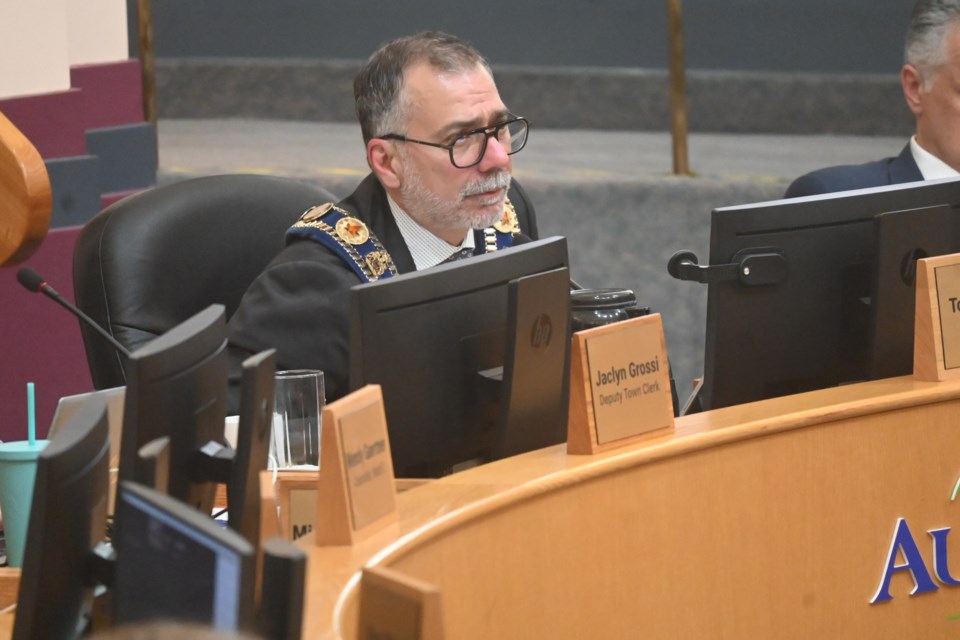Mayor Tom Mrakas has once again vetoed a potential pay increase for Aurora councillors.
The mayor announced his decision in a statement and vetoed the decision using strong mayor powers given by the province to several heads of council across Ontario to further provincial priorities, particularly related to the housing crisis.
“This week, I have signed the decision to veto the bylaw,” he said, noting that compensation was not included in the 2024 budget. “The unbudgeted utilization of taxpayer funds for this purpose could potentially interfere with provincial and town priorities, including anticipated initiatives that may be brought forward in 2024 for affordable housing and infrastructure,” he said.
“I am hopeful that this action will resolve this matter, enabling council to refocus on pressing issues such as housing, infrastructure, downtown revitalization, and economic growth, thus continuing the positive direction and growth of our community.”
At issue is a compensation increase for elected members that has been before council on four individual occasions since last fall.
It amounted to a 30 per cent pay increase with the balance related to associated benefits.
It has been a fraught debate around the council table with Mayor Mrakas last opting to remove the compensation increase from the 2024 budget following council’s initial approval of the raise last fall.
The debate has sparked wars of words around both the council table and within the community. Proponents of the raise on council have cited low compensation of elected members compared to counterparts in similar municipalities in the GTA and the high salary of Mayor Mrakas compared to other heads of council in like towns and cities, as well.
Detractors of the raise on council, in turn, have argued that outgoing councils need to set any salary increases for the incoming council and that candidates who put their names forward in the 2022 municipal election were well aware of what compensation would be this term.
Another sticking point has been the inclusion of council pension through OMERS, for which Ward 4 Councillor Michael Thompson signed up prior to the mayor’s first veto.
This decision was criticized by Ward 5 Councillor John Gallo who said it was “hypocrisy” for Councillor Thompson to sign up for this while arguing against council compensation – but Councillor Thompson said he said he decided to opt in while it was available. As he had enrolled during that period, Mayor Mrakas said he felt it was “unfair” to remove OMERS for “every other member when one member is already receiving it.”
The latest attempt at a raise was last before council at its March 25 meeting where it was approved on a vote of 4 – 2. Those in favour included Ward 1 Councillor Ron Weese, Ward 2 Councillor Rachel Gilliland, Ward 3 Councillor Wendy Gaertner and Councillor Gallo. Voting against the motion at the meeting was Mayor Mrakas and Ward 6 Councillor Harold Kim. Councillor Thompson was not present for the meeting.
Following the March 25 session, Mayor Mrakas said he would take the subsequent 14 days to determine whether or not he would exercise his veto.
“We have now debated and discussed a council compensation increase four times in less than a year,” he said in a statement the day after the meeting. “As a council, I believe our focus should be on more pressing matters that directly impact our residents.
“I will not be swayed or pressured into approving a decision that residents of Aurora have made clear to me they staunchly oppose, and I believe does not serve the best interests of our community.”
The matter was brought back before council last month by Councillor Gallo who said he wanted to give council members who were absent from the last debate to voice their views.
He pushed back on the idea that council compensation should only be determined by an outgoing council ahead of a municipal election to vote for incoming members.
The process here, he said, was not particularly different as council would be voting on recommendations from a committee struck in the previous term.
“You can change the timing of it and that’s fine, but a committee was struck, we took that what the committee had recommended, and we moved that forward,” he said. “It is no different than if we struck a committee last year. Those recommendations would have found themselves on a budget and the sitting council would have approved their increase. It happens every year. Every term it happens. There is no difference here. This concept that we’re doing something wrong is preposterous and I certainly wouldn’t be putting this forward this many times if I thought I was doing something wrong or incorrect or unjustified.”
On the part of Councillor Gilliland, revisiting the issue was a matter of process.
“In my opinion, we are back here not about the compensation, but my belief about the process and the strong mayor powers that were utilized,” she said, adding that funding the increase through Aurora’s tax rate stabilization reserve would result in no impact on the tax levy. “I did seek external legal counsel as recommended by staff and the question still remains: does strong mayor powers have oversight of the budget only when it relates to affecting the tax levy, or both?
“I stand for fairness and equity, but for me, it is not just about me – it is about the next person and the person after that that sits in this chair. I have listened and I have already listened to the concerns of the residents and have said before I wouldn’t engage in any of the compensation benefits. I will be voting in favour of this process because, as I said, I believe this is an over-reach and the process that lurks in the grey area…not fully understood. Strong mayor powers outside of advancing housing priorities is simply undemocratic – strong and wrong.”
Brock Weir is a federally funded Local Journalism Initiative reporter at The Auroran
